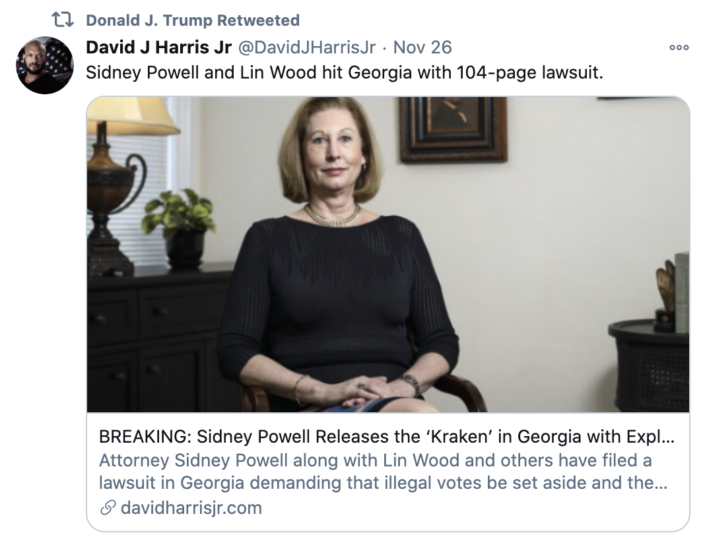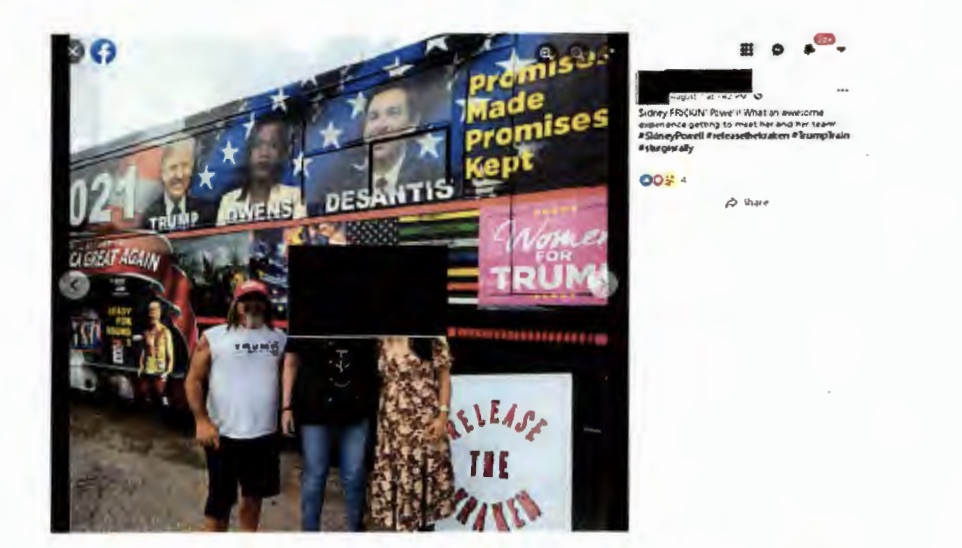Three Months Later, DOJ Finally Gets Interested in Sidney Powell’s Militia Defense Fund
In the Oath Keepers case, the government just sent out a letter raising concerns about DC’s Rule 1.8(e) that governs the ethical obligations in cases where a third party pays for someone else’s defense. That’s allowed, but there are three necessary conditions: that the defendant make informed consent, that the payor not interfere in case decisions, and that information about the case may not be shared with the payor.
(1) The client gives informed consent after consultation;
(2) There is no interference with the lawyer’s independence of professional judgment or with the client-lawyer relationship; and
(3) Information relating to representation of a client is protected as required by Rule 1.6.
At issue is the scheme that BuzzFeed revealed and Mother Jones later reported that describes that Sidney Powell is paying for some of the Oath Keepers’ defense.
As the government describes, in response to the government’s queries, lawyers for Stewart Rhodes and Jessica Watkins did not respond, the Meggs’ lawyers and that of Kenneth Harrelson say they’re in compliance with the rule, and William Shipley, who is representing Roberto Minuta, said he’d respond to Judge Mehta’s inquiries, but didn’t answer to DOJ.
1. Attorney David Fischer, who represents Thomas Caldwell, stated that he was in compliance with Rule 1.8(e) and that he “has received no funding from, and has no affiliation with, Defending the Republic.”
2. Attorney Scott Weinberg, who represents David Moerschel, stated he was in compliance with Rule 1.8(e) and that he was not receiving any funding from Defending the Republic.
3. Attorney Gene Rossi, on behalf of himself and co-counsel Natalie Napierala and Charles Greene, who represent William Isaacs, stated that they were in compliance with Rule 1.8(e) and that they were not receiving any funding from Defending the Republic.
4. Attorney Tommy Spina, on behalf of himself and co-counsel Edward B. MacMahon, Jr., who represent Jonathan Walden, stated that they were in compliance with Rule 1.8(e) and that they were not receiving any funding from Defending the Republic.
5. Attorneys Julia Haller and Stanley Woodward, who together represent Kelly Meggs and Connie Meggs, stated that they were in compliance with Rule 1.8(e). They did not specifically inform the government whether their fees were being paid by Defending the Republic.
6. Attorney William Shipley, who represents Roberto Minuta, declined to answer, but wrote, “Should Judge Mehta wish for my client or me to explain the arrangement for funding my client’s legal defense in order to confirm that my client’s Sixth Amendment right to conflict-free counsel are being afforded – or waived – we will provide him with whatever information he requests.”
7. Attorney Bradford Geyer, who represents Kenneth Harrelson, stated that he was in compliance with Rule 1.8(e). He declined to inform the government whether his fees were being paid by Defending the Republic.
The other defense counsel whom the government believes to be retained rather than court-appointed – Phillip Linder and James Lee Bright for Stewart Rhodes, and Jonathan Crisp for Jessica Watkins – have not yet responded to the government’s letter.
The letter DOJ sent to the defense attorneys suggested that Powell’s interests may diverge from these defendants.
The Supreme Court has said that “inherent dangers . . . arise when a criminal defendant is represented by a lawyer hired and paid by a third party.” Wood v. Georgia, 450 U.S. 261, 269 (1981). In Wood, the third-party payer was the “operator of the alleged criminal enterprise,” and thus the lawyer had an interest in the clients not testifying against the third-party payer or taking other actions contrary to the payer’s interest.4 Id. Indeed, comment 10 to Rule 1.8 explains that “third-party payers frequently have interests that differ from those of the client.” Here, Defending the Republic may have interests that diverge from these defendants.
4 As Defendant Kelly Meggs’s former counsel Jonathon Moseley told Mother Jones, Defending the Republic’s “financial support has the effect of making plea bargains less likely.” This fact could be against the interest of a particular defendant.
I’m happy DOJ is addressing this. The lawyers who are reported to be on Powell’s dole seem to be pushing conspiracy theories in lieu of a real defense.
What I don’t understand is the timing. BuzzFeed first reported this on March 9. DOJ only sent out its inquiry letter on June 16, over three months later.
And thus far, DOJ is only raising this in the Oath Keepers’ case. At the very least, you’d think DOJ would make similar inquiries in the Ryan Samsel case; he’s represented by the same team, Stanley Woodward and Juli Haller, as is representing the Meggses. And after he was assaulted, Samsel seemed to decide not to cooperate (against what would be Joe Biggs).
Similarly, William Shipley is representing a slew of defendants, including many of the Proud Boys who might most immediately implicate Biggs.
Finally, Jimmy Haffner, one of the Proud Boys accused of helping to open up the East Door of the Capitol, posed with Powell when her fundraising bus came through town in 2020.
Of course, DOJ has been investigating Powell herself since at least September, so maybe they’re learning of new conflicts only now.
So who else is Sidney Powell paying? And why is DOJ only doing something about it now?






Interesting timing with today’s news that J6 committee is postponing the rest of June’s hearings into July because they have been receiving troves of new information. It’s getting noisy.
Tomorrow’s hearing regarding DOJ (which itself is a re-schedule of last Wednesday’s hearing) is still happening. Other subsequent hearings are being pushed into July:
https://www.cnn.com/2022/06/22/politics/january-6-hearing-delays-july/index.html
Is the sound I hear that of scurrying rats?
The timing from DoJ is concerning.
And how can they prove that information is not being passed?
Especially since the lawyers all appear to come from the same alien spaceship that Ms. Powell beamed herself down from.
It’s possible that the Select Committee shining a Big Spotlight last week on $250M fundraised into an apparently non-existent Election Defense Fund either accelerated the timing of, and/or forced a degree of transparency into, DOJ interest in the matter?
Doubtful.
That $$ was separate from her fundraising.
I think I know.
What if a previously cooperating witness (or his/her lawyer) admitted that non-public info was being shared by various defendants with Sidney Powell or their associates in contravention of part 3 of the rule?
Like, say, discovery from DOJ? Or maybe a proffering witness was instructed to lie by Powell’s team? If the lawyer is found to be in violation of that rule and dismissed as counsel, couldn’t he/she be compelled to testify about such instances in front of a GJ, if they represented criminal acts or overt actions in furtherance of a conspiracy?
And if DOJ knew this in March, they might’ve wanted to hold their cards close to see where such info led them. Like, you know maybe the J6 cmte revealed something recently that got people talking again?
The ole’ “tickle the wire” trick, hmm?
All of this is speculation, obviously, but having the public reporting serve as a predicate for the motion certainly gives plausible deniability to DOJ about what they knew, when.
I think that’s one possibility (and even have two potential people in mind).
It’s also worth noting that the jail Samsel is in has allegedly caught him making threats that he hadn’t been making before.
You think he’s the one who’s been blabbing? He certainly is enough of a hothead, perhaps he’s worried that he might be the fall guy for a lot of stuff?
Also, he’s been in the SHU a lot lately…away from prying prison snitches’ eyes…..
Another possibility . . .
A defendant lets slip that a change in legal strategy was made in order to please a third party funder. “The folks paying the bills wanted me to fight, not plead, so here we go . . .”
God knows that some of these folks aren’t the sharpest knives in the drawer. Recall, please, that Baked Alaska screwed up his own plea deal when he told Sullivan (in essence), “I didn’t do it, but I’ll accept this deal and plead guilty to a misdemeanor to make it all go away without being charged with a felony.” Sullivan then said “OK, we’re going to trial then, because I can’t accept a plea if you don’t admit guilt. Let’s talk schedules . . .”
Ironically, and contra Judge Sullivan, that’s probably the basis for a shitload of plea deals – for both the prosecution and defense.
But you can’t say the “I didn’t do it” part out loud in court.
And certainly not in front of Emmett Sullivan when he’s still mad about the Mike Flynn fiasco. Although, Sullivan’s probably going to be mad about that for the rest of his life (and justifiably so, imo).
The justice system is heavily rewarding defendants that lie?
The widespread cynicism and apathy in the USA around the goverment and the law makes more sense now.
That is pure unadulterated horse manure. The snitches get rewarded, same as they always have. The “cynicism” about the law is almost always by people that don’t know diddly squat about it. Go see some of it in action at your local courthouse and get back to me. Until then don’t whine about it, because you know nothing about what you are talking about. Your “cynicism” is based on internet outrage and hyperbole.
Carissa Byrne Hessick wrote a whole book about it:
Punishment Without Trial: Why Plea Bargaining is a Bad Deal (2022).
Unless you are innocent and are convicted, and get a life sentence because you refuse to say you did it when you didn’t. No plea offered. You know, because no remorse for something you did not do.
There is so much loose money floating around that a few thousands/millions in reality or in promises could probably make anybody change their position.
Hard to tell where Sidney got all of her wealth that she’s offering. Unless we can really follow the money and cause the big fish to feel some pain, they’ll keep on trying to foul the waters.
Can a J6 defendant represented by counsel paid for by Powell later claim that their counsel was compromised (addicted to CT’s at payer’s behest) and therefore a new trial should be held?
I would be curious to see if future sentences from Jan 6th defendants. I know judges are supposed to be impartial, but . . . .
Are communications between the lawyer and the funder subject to attorney-client privilege? What about communications between only the client and the funder?
If they had a warrant for the funder’s emails, but needed to run everything through a taint team before taking next steps, might that explain the delay?